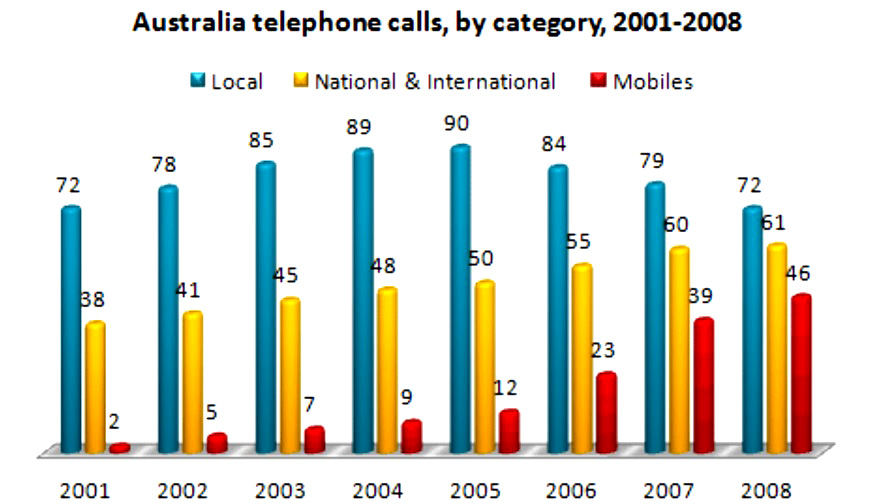The barchart below shows the total number of minutes (in billions) of telephone calls in Australia, divided into three categories, from 2001- 2008. Summarise the information by selecting and reporting the main features and make comparisons where relevant.
Write at least 150 words.

As life expectancy is increasing, people work after retirement with pay. Alternatively, some people start to work at a young age.
Are these positive or negative impacts?
Give reasons for your answer and include any relevant examples from your own knowledge or experience.
Write at least 250 words.
WRITING TASK 1
The chart shows the time spent by Australian resident on different types of telephone calls between 2001 and 2008.
Local fixed line calls were the highest throughout the period, rising from 72 billion minutes in 2001 to just under 90 billion in 2003. After peaking at 90 billion the following year, these calls had fallen back to the 2001 figure by 2008.
National and international fixed line calls grew steadily from 38 billion to 61 billion at end of the period in question, though the growth slowed over the last two years.
There was a dramatic increase in mobile calls from 2 billion to 46 billion minutes. This rise was particularly noticeable between 2005 and 2008, during which time the use of mobile phones tripled.
To sum up, although local fixed line calls were still most popular in 2008, the gap between the three categories had narrowed considerably over the second half of the period in question.
(157 words)
WRITING TASK 2
Over the past few decades, people have become used to the idea that they will have to devote a larger proportion of their life to working, and some of them even continue to work after the legal age of retirement. The fact is that as human life expectancy increases, only a small number of jobs will ensure that people are able to enjoy a comfortable retirement, and therefore, many people are choosing to enter the workforce much earlier than before. In my opinion, this is a negative development.
I agree that starting to work at a young age is advantageous for young people, but they should only consider this as a way of gaining experience. Having a job while studying with the aim of saving money to enjoy retirement is both unrealistic and counter-productive. For one, most part-time jobs students can do, like bartending or tutoring, only offer quite low salaries, certainly not enough to contribute to their retirement. Also, many high paying jobs, such as lawyers or doctors, require a qualification that can take up to 6 years to acquire, and therefore are not possible for young people to do at a young age.
On the other hand, people nowadays are still fit to continue working well into their sixties or even seventies. I believe working keeps people not only mentally but also physically healthy, which is extremely important for the elderly. For example, my grandfather admits that he felt so bored and unhealthy after retirement that he had to set up a workshop near his house and has been working there ever since. This example also suggests that people should not consider working at a younger age as a way to save money for retirement.
In conclusion, I understand there are reasons for young people to start their working lives earlier than the generations of their parents or grandparents. However, working after the retirement age is a way to enjoy a longer life expectancy, and therefore there is no obligation to have a job and save money from an earlier age.
(343 words)
